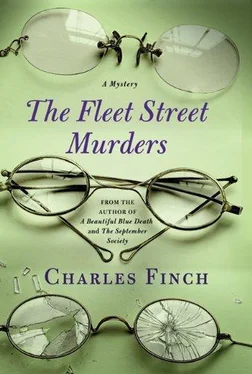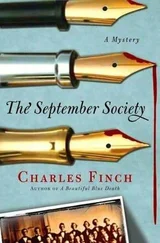Charles Finch - Fleet Street murders
Здесь есть возможность читать онлайн «Charles Finch - Fleet Street murders» весь текст электронной книги совершенно бесплатно (целиком полную версию без сокращений). В некоторых случаях можно слушать аудио, скачать через торрент в формате fb2 и присутствует краткое содержание. Жанр: Исторический детектив, на английском языке. Описание произведения, (предисловие) а так же отзывы посетителей доступны на портале библиотеки ЛибКат.
- Название:Fleet Street murders
- Автор:
- Жанр:
- Год:неизвестен
- ISBN:нет данных
- Рейтинг книги:5 / 5. Голосов: 1
-
Избранное:Добавить в избранное
- Отзывы:
-
Ваша оценка:
- 100
- 1
- 2
- 3
- 4
- 5
Fleet Street murders: краткое содержание, описание и аннотация
Предлагаем к чтению аннотацию, описание, краткое содержание или предисловие (зависит от того, что написал сам автор книги «Fleet Street murders»). Если вы не нашли необходимую информацию о книге — напишите в комментариях, мы постараемся отыскать её.
Fleet Street murders — читать онлайн бесплатно полную книгу (весь текст) целиком
Ниже представлен текст книги, разбитый по страницам. Система сохранения места последней прочитанной страницы, позволяет с удобством читать онлайн бесплатно книгу «Fleet Street murders», без необходимости каждый раз заново искать на чём Вы остановились. Поставьте закладку, и сможете в любой момент перейти на страницу, на которой закончили чтение.
Интервал:
Закладка:
The three men sat and discussed it for some time before finally agreeing that they would reconvene in the morning. Lenox felt discouraged; it all seemed so opaque.
Then, in the middle of the night, long after Dallington’s departure, Lenox woke out of a dream and sat bolt upright.
Suddenly he understood it all.
Barnard had insisted on keeping an office in the Mint, according to Dallingon, but why would he have wanted to, unless-
“Of course,” said the detective softly. “It’s the only reason he took the job in the first place, I’d wager. The cunning fox.”
He stood up and hurriedly began to throw on clothes, in the absolute certainty that even at that moment, George Barnard was somewhere amid the wide corridors and large offices of the Royal Mint-
Robbing it.
CHAPTER FORTY-FOUR
Lenox was peering down the long, narrow stairs that led to the basement and the servants’ quarters. He had rung a bell as soon as he woke and heard noises below.
“Graham? Graham?”
“Sir?”
“Come here!”
“Just a moment, sir.”
“Hurry!”
Poor Graham, who was a deep sleeper, struggled as quickly as he could to fit into a suit and appeared a moment later.
“Yes, sir?”
Lenox explained.
“What do you propose to do, sir?”
“Go there, of course! Don’t be daft! I need you to go fetch Jenkins-there’s not a moment to lose!”
“Yes, sir. Are you certain that you wouldn’t prefer to wait for the inspector?”
“No,” said Lenox. “It will be dawn in two hours, and Barnard’ll only feel comfortable working at night-probably he’s been there every night since he supposedly left for Geneva. I only hope he isn’t gone already.”
“Are you certain of all this, sir?”
“Of course I am-he wants to make one last fortune before he leaves London, Graham. And I was also thinking as you dressed, do you remember that I found all of the articles under Barnard’s file in that pub?”
“Yes, sir.”
“One of them was about the history of the building, the layout and architecture! What if Barnard asked Carruthers to write that article, as a way of obtaining the information without asking for it himself?”
“Perhaps, sir,” said Graham doubtfully.
“Oh, bother-listen, I know it! I know his mind! He won’t be easily able to extricate his investments if he disappears, which he’s evidently chosen to do in a great hurry, and every fiber of his being will be yearning for more money! I know his mind, I tell you!”
“Yes, sir. I shall be close behind you.”
“Will you get my brown leather kit?”
“Of course, sir.”
It was a long ride east, just past Tower Bridge, to get to the Royal Mint Court in East Smithfield, and Lenox spent it contemplating the Thames through his window and slowly rubbing out the imperfections of his reasoning until it was satisfactory to him. His mind was roiling with possibilities.
At length he directed his driver to stop, one street short of his destination, and walked the rest of the way. He stopped when he saw the broad facade of the Mint; it was a long building made of limestone, with a high, stately arch at its center, a building that managed to seem at once distinguished and entirely uninteresting. A black wrought-iron gate, firmly clasped shut, stood between its courtyard and Lenox on the sidewalk. He began to walk the fence, looking for a point of access.
The Royal Mint held an exalted place in the history of England, and it had been a great pride of Barnard’s to know its history inside and out. It was Alfred the Great who had first gathered in hand the muddled system of moneyers’ workshops in Anglo-Saxon times and founded the London Mint, in 886. By 1279 the Mint was firmly entrenched in the safest single place in England-the Tower of London, where it remained for five centuries. In 1809 it had moved to a vast, golden-stoned building in East Smithfield, where it stood regal, imposing, and remarkably well guarded.
It had been a coup for George Barnard to attain the post of Master, which was traditionally held by a great scientist or an aristocrat-and occasionally, as in his case, by an important politician. (The leader of Lenox’s party in the House of Commons now, William Gladstone, had been one of these, Master of the Mint from 1841 to 1845.) The greatest of these Masters had been Isaac Newton, who held the post for nearly thirty years, until his death.
Yet now what a threat it was under! Lenox had assumed even after he began to suspect Barnard’s nefariousness that the Mint was the one sanctified aspect of his life, his own fortress of immortality.
It seemed, however, nothing was inviolable.
Lenox had some idea of what it was like inside; he had never entered it himself, but when he had asked Graham to do his research on Barnard, Lenox had conducted his own about the Mint’s building and the Master’s place in it. At the Devonshire Club he had asked old Baron Staunton, a distinguished Liberal politician who had sat in Parliament for many years but had once been Master himself, about the place-all ostensibly in the guise of polite interest but in fact with keen attention to Staunton’s rather rambling and sentimental reminiscences. Thus Lenox knew that the machines and the money they made were kept in the lower floors, under heavy guard, and that the upper levels of the building contained the Mint’s offices. He had also learned that the Master’s office itself had a view of the Thames, which meant it would be situated toward the western part of the building.
Then again, Staunton had been Master twenty years ago, and as he walked Lenox felt a twinge of anxiety; it could be that all of his information was out of date.
At last he concluded that there was nothing for it but to shimmy up and over the gate. He had in his right hand a doctor’s kit bag, the one he had asked Graham for, a battered pebbled leather case with an ivory handle that unclasped in the middle. It was light but spacious, and he had had it since he was twenty-four.
He set this down beside him and pulled from it a long, stout piece of string, which he tested by quickly jerking it in the middle with both hands. Satisfied, he made a loop at one end and after several attempts managed to hook it on one of the (unpleasantly sharp-looking) spikes that lined the top of the fence. He tossed his bag over the fence and with a deep breath pulled himself over.
It was sweaty work, and he slipped back to the ground twice, but eventually he just managed to make it to the other side. He quickly pulled the rope down (he had loosened it when he was coming over the fence) and packed it carefully away in his kit before stealing across the empty courtyard to the grand, dark building itself.
At the front of the building was a series of heavy black doors, but Lenox knew he stood a better chance of gaining access through a side door and, trying to minimize the clack of his shoes on the stones, began to look around the perimeter. About halfway around he found something promising-a white door marked CARETAKER that had a window at eye level. If worse came to worst, he could break the window, but he didn’t want to make the noise.
Instead he opened his case again and took two small tools from it. Fortune was on his side; it was an old-fashioned lock, and within about a minute he had managed to jiggle it open. As he had expected, it wasn’t impossibly hard to break into the building (and a good detective, as he had once said to Graham, always needs to be in some small part a good housebreaker, too).
He imagined the vaults would be a different story.
With slow, careful steps he walked up the stairway in front of the door, ignoring the caretaker’s closet to the left. At the top of the stairway was another door, and opening it he found himself in a wide, marble-floored corridor, which he saw in the dim moonlight was of regal bearing, with busts of past Mint Officials and portraits of past monarchs along the walls.
Читать дальшеИнтервал:
Закладка:
Похожие книги на «Fleet Street murders»
Представляем Вашему вниманию похожие книги на «Fleet Street murders» списком для выбора. Мы отобрали схожую по названию и смыслу литературу в надежде предоставить читателям больше вариантов отыскать новые, интересные, ещё непрочитанные произведения.
Обсуждение, отзывы о книге «Fleet Street murders» и просто собственные мнения читателей. Оставьте ваши комментарии, напишите, что Вы думаете о произведении, его смысле или главных героях. Укажите что конкретно понравилось, а что нет, и почему Вы так считаете.












